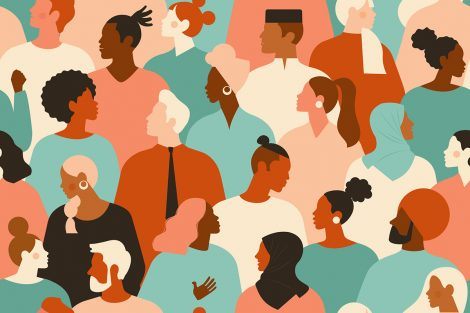Student-organized HEAL conference focused on promoting health equity in the U.S. and globally
May 12, 2021—In a year marked by the collective trauma of the COVID-19 pandemic, and increased public reckoning around racism in the U.S., the 2021 Health Equity and Leadership (HEAL) Conference at Harvard T.H. Chan School of Public Health kicked off with a call to reimagine what it means to practice public health.
Affirming human life is at the field’s core, said Rev. Karlene Griffiths Sekou of The Dignity Project International in her keynote remarks. “What then does is mean to address health equity, and to be leaders in this moment?” Sekou called on attendees at the April 30, 2021 virtual event to ask questions at their workplaces about how marginalized people will be affected by programs and policies—and to go a step farther and bring those communities into discussions about solutions.
This year’s conference, organized by the School’s Equity, Diversity, and Inclusion Fellows, also included sessions focused on issues at the intersection of public health and social justice—including discrimination faced by low-caste Dalit women in Nepal, health outcomes resulting from surveillance and policing targeting Muslim Americans and other people of color, and the role of eugenics in reproductive health. More than 500 people from the U.S. and around the world registered to attend the event, hosted on an interactive platform, with many participating in chats during the talks and sharing resources on message boards.
“I personally felt recharged by the conference,” said Sana Farooqui, MPH ’21, who helped organize the conference and facilitated the session on surveillance. “After a particularly tough year–especially for folks who advocate for equity and anti-racism efforts– it was incredibly healing and restorative to learn from such insightful speakers and, in a way, gather the strength to continue this work.”
Other EDI fellows involved in organizing the conference and leading sessions included Aharisi Bonner, MPH ’22, Candice Danielle Carpenter, MPH ’21, Jennifer Lee, MPH ’21, Isha Nirola, DrPH ’21, and Valentina Vargas, SM ’21
Ra’Shaun Nalls, director of community engagement and an advisor to the EDI fellows, reflected on the past year in opening remarks at the conference. He said, “I’ve realized that to effectively address the complexity of racism and social justice means to commit to a lifetime of learning and education, and most importantly, that social justice is an action-oriented process.”
Noting the work still to do, Nalls asked attendees to consider the difference between optimism—confidence that outcomes will be positive—and hope, which shows courage and resilience in the face of long odds. “I leave you to reflect on this word hope and how we can stand together in collective action to not only fight against injustice, but to fight for fundamental human rights across the globe.”
